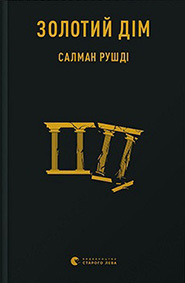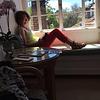Take a photo of a barcode or cover
challenging
dark
reflective
slow-paced
Plot or Character Driven:
Character
Strong character development:
Yes
Loveable characters:
No
Diverse cast of characters:
Yes
Flaws of characters a main focus:
Yes
challenging
mysterious
slow-paced
adventurous
dark
funny
mysterious
reflective
sad
tense
medium-paced
Plot or Character Driven:
Character
Strong character development:
Complicated
Loveable characters:
No
Diverse cast of characters:
Yes
Flaws of characters a main focus:
Yes
Not interested in the characters who care too much for assimilation
challenging
emotional
funny
reflective
medium-paced
Plot or Character Driven:
Character
Strong character development:
Yes
Loveable characters:
Yes
Diverse cast of characters:
Yes
Flaws of characters a main focus:
Yes
There were many parts of this book that I liked. I have enjoyed many magical realism novels over the years. This is only my second Rushdie after midnights children. I liked the pop culture references particularly film, some I got, some I didn’t. There were some lines so good I highlighted them! But in the end I think it was the election analysis that spoilt it for me. It seemed superficial. Perhaps the reason 90m people didn’t vote is they didn’t like either choice...
This was strangely my first Rushdie novel and clearly will not be the last. So many aspects of the modern life - be it political, personal, questions of identity, social are a part of the narrative and seamlessly done. Initially, it took me some time to get into it as the story telling is a little slanting, nothing is hit directly, but, once I got into it, I found it hard to put down.
I would definitely recommend the book to anyone interested in family relationships and their dynamics.
I would definitely recommend the book to anyone interested in family relationships and their dynamics.
adventurous
mysterious
reflective
sad
medium-paced
Plot or Character Driven:
Character
Strong character development:
Complicated
Loveable characters:
Complicated
Diverse cast of characters:
Yes
Flaws of characters a main focus:
Yes
Reading Salman Rushdie's latest novel was a fascinating experience for me. I won't offer a summary, since that has already been done so well by so many.
I found the characters and the subplots engrossing and the writing brilliant and engaging. The vocabulary excited me. Yes, really, especially the word DOTARD--I mean, did Kim Jong-un's translator read this? And it's not often that an author uses the term "eschatology." (Salman Rushdie and David Foster Wallace are my only experiences.)
The pop culture and literary references are intriguing fun, and made me feel that I belonged within these pages. And at times, Rushdie is incredibly prescient.
The Golden House is ripe for discussion, for there are some mysteries left in the end. It is Nero Golden whose history forms the backbone of this tome, and he is a complex personality. Rushdie seems to challenge us readers to question what parts of him are good, which bad. How responsible is he for all that happens to his family? Golden's complexity is a contrast to The Joker, a character who enters the political arena and casts a purely dark, evil background to the story. And yes, everyone who reads this novel will know exactly who The Joker is. Rushdie is sure to offend some, but we know he's not afraid of that.
Bravo! This is a masterpiece.
I found the characters and the subplots engrossing and the writing brilliant and engaging. The vocabulary excited me. Yes, really, especially
The pop culture and literary references are intriguing fun, and made me feel that I belonged within these pages. And at times, Rushdie is incredibly prescient.
The Golden House is ripe for discussion, for there are some mysteries left in the end. It is Nero Golden whose history forms the backbone of this tome, and he is a complex personality. Rushdie seems to challenge us readers to question what parts of him are good, which bad. How responsible is he for all that happens to his family? Golden's complexity is a contrast to The Joker, a character who enters the political arena and casts a purely dark, evil background to the story. And yes, everyone who reads this novel will know exactly who The Joker is. Rushdie is sure to offend some, but we know he's not afraid of that.
Bravo! This is a masterpiece.
The Golden House is a relevant and highly referential novel that charts the recent years of American culture and politics through the story of an immigrant real estate tycoon. Nero Golden moves to New York from Mumbai with his three grown up sons, where they are watched and befriended by their neighbour René, an aspiring filmmaker. René narrates the novel and charts the fall of the house of Golden, set against the years of the Obama presidency and the recent US election.
Rushdie writes in a captivating style from the outset, with a mysterious narrator who has a degree of self-consciousness about his own growing involvement in the story he is telling. The conceit of René being a filmmaker who slips into writing in a film script structure at times and who deviates from the narrative by discussing and comparing events to classic cinema works well to give the novel a sense of truth and fiction, an invented narrative suffused with real life events and popular culture references. Literary references are used more sparingly, but the narrator slips in Eliot’s Prufrock and various other quotation at times. The combination of these references with key elements of recent culture from gamergate to prejudice surrounding gender identity creates a novel that is very much situated in the modern world, whilst self-consciously telling a story.
The narratorial coyness surrounding real political events—a certain president’s rise, for example, is depicting though not in so many words—has a faintly smug feel, but this serves as part of the enjoyment too. The style is distinctive and will be a hit with anyone who likes highly referential prose with a degree of self-awareness. The narrative is gripping, with the story moving between Nero, his three sons, and the narrator René, and with a tendency to foreshadow that isn’t too obtrusive. Near the end there is a fair amount of exposition that can get a little slow, but otherwise the pacing is good and the story an interesting mix of drama, gangsters, identity, and lies.
In The Golden House, Rushdie has clearly written a novel for the Trump era, for the internet age of trolls, and for the mix of the old and the new. There is something about the book, particularly in its style and narration, that draws the reader in, even whilst it celebrates its own clever references. It is about reinvention and transformation, and about media for telling stories. Rushdie has captured at least some element of the modern day and it is worth reading.
Rushdie writes in a captivating style from the outset, with a mysterious narrator who has a degree of self-consciousness about his own growing involvement in the story he is telling. The conceit of René being a filmmaker who slips into writing in a film script structure at times and who deviates from the narrative by discussing and comparing events to classic cinema works well to give the novel a sense of truth and fiction, an invented narrative suffused with real life events and popular culture references. Literary references are used more sparingly, but the narrator slips in Eliot’s Prufrock and various other quotation at times. The combination of these references with key elements of recent culture from gamergate to prejudice surrounding gender identity creates a novel that is very much situated in the modern world, whilst self-consciously telling a story.
The narratorial coyness surrounding real political events—a certain president’s rise, for example, is depicting though not in so many words—has a faintly smug feel, but this serves as part of the enjoyment too. The style is distinctive and will be a hit with anyone who likes highly referential prose with a degree of self-awareness. The narrative is gripping, with the story moving between Nero, his three sons, and the narrator René, and with a tendency to foreshadow that isn’t too obtrusive. Near the end there is a fair amount of exposition that can get a little slow, but otherwise the pacing is good and the story an interesting mix of drama, gangsters, identity, and lies.
In The Golden House, Rushdie has clearly written a novel for the Trump era, for the internet age of trolls, and for the mix of the old and the new. There is something about the book, particularly in its style and narration, that draws the reader in, even whilst it celebrates its own clever references. It is about reinvention and transformation, and about media for telling stories. Rushdie has captured at least some element of the modern day and it is worth reading.






